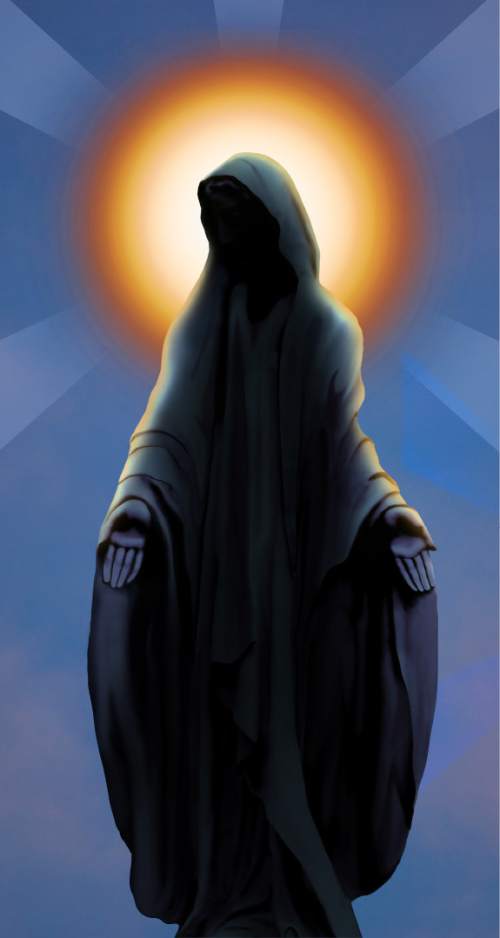This is an archived article that was published on sltrib.com in 2015, and information in the article may be outdated. It is provided only for personal research purposes and may not be reprinted.
After more than a century and half of de facto believing in a female deity, the LDS Church recently published an essay making it clear — Heavenly Mother exists and should be celebrated as part of Mormon doctrine.
Beyond acknowledging her existence, though, the church's Oct. 23 article didn't fill in many details about the eternal wife to Heavenly Father.
"As with many other truths of the gospel, our present knowledge about a Mother in Heaven is limited," the essay states. "Nevertheless, we have been given sufficient knowledge to appreciate the sacredness of this doctrine and to comprehend the divine pattern established for us as children of heavenly parents."
Some commenters in the so-called Mormon bloggernacle, hunger for more connection to this female deity.
"I suppose it is sufficient if all I am to know is that my Heavenly Mother had many children and is married to my Father in Heaven, both qualities I do love and respect, but I am not sufficed there," writes By Common Consent blogger Ashley Mae Hoiland. "We don't have many details, but is that the final say?"
What role does she play in answering prayers? Which of her qualities should Mormon women emulate? How can believers connect to her?
"I need a mother. I don't need the notion of a mother, or even the appreciation for a mother. I need a mother that comes with me in the middle of the night to take care of a child," Hoiland writes. "I need a mother who nurtures my intellect and challenges me to do more. I need a mother who believes in social justice and rages with me when I don't know where else to go. I need a mother who validates my wildness and urges my ideas to take root."
It is not enough, she reasons, "to simply accept the idea that somewhere, somehow, there is a mother who we believe loves us. "
Mormons need to speak of Heavenly Mother, think about her, ponder and study about her, Hoiland writes. "I was recently in [a meeting] that asked repeatedly what we could learn about motherhood from Heavenly Father, and while there are many valid and wonderful things, couldn't we most likely learn a thing or two about motherhood from Heavenly Mother? She did more than create us, I assume that she helped raise us."
Is it wrong to wonder, asks Emily Grover, another BCC blogger, "if [Heavenly Mother] is nearby, keeping me company and knowing me personally?"
The writer hopes that Mormonism's next generation "will wonder less about these things and instead feel conviction that both of their heavenly parents are encircled about them in love and empathy and wisdom."
Latter-day Saints can come to know Mother God's "likeness as more stories of women are heard from the mouths of women over our pulpits."
Not everyone wants the Utah-based Church of Jesus Christ of Latter-day Saints to spell out qualities of the divine feminine.
Rachel Whipple, writing before the Heavenly Mother essay was published, celebrates the journey of discovering those for herself.
"There is something creative about getting to know God: to recognize the infinite attributes of God and to express that ineffability in testimony and story, art and song," Whipple writes in a Times & Seasons essay. "Sometimes, one person's vision of God becomes codified, set in stone as the truth for all people. It may be a beautiful, profound view of God, one that answers the yearning of the time. But God is greater than even the most perceptive one's capacity to behold, much less fully communicate."
Mother God "is the dark side of the moon, the substantial half of God as yet hidden from the searchlight of institutional revelation," Whipple writes, "and the strictures of correlated curriculum."
Don't dictate who Mother in Heaven is, the blogger pleads. "Let me seek her for myself."
Either way, LDS leaders want the Heavenly Mother article — and other recent essays on Mormon theology and history — to spur conversations about these sometimes-touchy topics.
"The church hopes that the material will be referenced in various lessons and classes, cited in talks and utilized in home study," declares a news release accompanying the latest essays, "along with the large volume of resource materials now available to church members worldwide."
As for how Mormons come to view their female deity, many writers are now pushing to make at least a small change — this one in the faith's Young Women weekly recitation.
It's time, says a petition, that these females from ages 12 to 17 say they are daughters of "heavenly parents," not just "Heavenly Father."
After all, Heavenly Mother, as the essay attests, is out there for everyone to know.
Peggy Fletcher Stack



